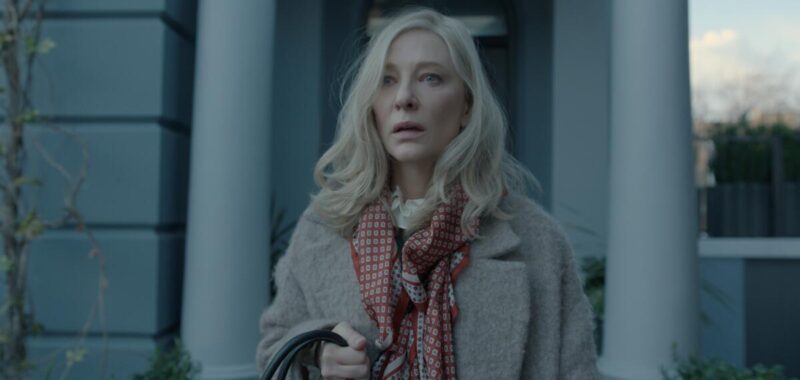In “Disclaimer,” premiering Friday on Apple TV+, Cate Blanchett plays Catherine Ravenscroft, an award-winning documentary filmmaker, married to Robert (Sacha Baron Cohen), a non-governmental organization consultant, and mother to Nicholas (Kodi Smit-McPhee), 25, living at home, selling appliances in a department store and a pale shadow of his high-achieving parents.
Presenting Catherine with an award, Christiane Amanpour (as herself) praises her films for cutting “through narrative and form that distract us from hidden truths,” though obfuscating, then revealing hidden truths by way of narrative and form is creator and director Alfonso Cuarón’s actual method. Of course, you can’t get away from narrative and form no matter how hard you try, even in a documentary.
One day, a package arrives addressed to Catherine, containing a pseudonymous novel that opens with the disclaimer that any resemblance between fiction and fact is intentional. She opens it up and immediately (cue disturbing flash-cut montage) recognizes that the main character is herself.
This book, we have already seen, is the work of the late Nancy Brigstocke (Lesley Manville), a manuscript newly discovered, several years after her death, by her husband Stephen (Kevin Kline), an English teacher who is tired of his work, his life and the whole modern world. Written secretly by Nancy during years of seclusion following the death of their son Jonathan (Louis Partridge) 20 years earlier, it purports to tell the story of Jonathan’s seduction by Catherine and his drowning while saving the life of Nicholas, then age 5, during a holiday in Italy. The truth of text is seemingly bolstered by a packet of erotic photos discovered alongside the manuscript.
Representing the manuscript as his own, Stephen is encouraged by a friend to self-publish; the book becomes his weapon of revenge — not so much for the death of his son, to whom he was not close, but for that death having destroyed his beloved wife, whose voice remains the outgoing message on their answering machine. And he sets out to make Catherine suffer.
We first meet Jonathan in what is not immediately apparent as a flashback, on holiday in Venice with a girlfriend, Sasha (Liv Hill); she will have to cut short her trip, leaving him alone to to be preyed upon by a hot older woman (Leila George as younger Catherine) in scenes whose Penthouse-letter absurdity might raise a red flag — though the silent-era iris ins and iris outs of these scenes remind us that we’re watching a film. So does narration that alternates between the main characters and an omniscient author, using first, second or third person singular, depending. So we are on shaky ground in matters of reliability — though the experience of watching a motion picture, no matter how mercurial, deceptive or dreamlike, is to take everything at face granted until instructed not to. Which is how “Disclaimer” messes with you.
Nevertheless, even the half-aware viewer will have questions about “The Perfect Stranger,” the novel within the novel, whose events play out on the screen as settled history, and which other characters accept as such, but which is full of things Nancy could not have possibly known. Had some of these people thought this through, it would have saved everyone much trouble, but, as the internet teaches us — and there’s a storyline in which Stephen catfishes Nicholas — it does not take much to generate panic. And saving people trouble is not the point.
The series is beautiful to behold, from first to last; Emmanuel Lubezki, Cuarón’s cinematographer on “Children of Men” and “Gravity,” and Bruno Delbonnel (“Amélie,” “Inside Llewyn Davis”) share the credit as directors of cinematography. And one can’t argue with the cast. It’s great to see Kline, who rarely appears onscreen these days, as both the older and younger Stephen — an out-of-time sad sack who sparks at having this new project, dedicating himself to it with a relish that more than borders on crazy. Manville, who seems to appear in every third series out of England, with good reason, makes her usual gourmet meal out of Nancy. And Blanchett, not surprisingly, stands up well to these forms and narrative distractions, though she is especially fine when asked to fall apart.
Cuarón (“Gravity,” “Roma”) is one the century’s most consistently lauded filmmakers, and there is no dearth of filmmaking in “Disclaimer,” which adjusts stylistically to mirror shifting points of view and actuality. It can come off a little pretentious, with its Roman numeral “chapter” titles, nervous zoom shots and ponderous voice-overs. (“You’re overwhelmed with the sadness of things lost. Your childhood, your own child’s childhood, your mother’s strength and your belief that you had absorbed that strength into your bones. … You know that your mother’s name is Helen and that Helen must have suffered anguish, loneliness and pain, but you don’t really know about it because for you, Helen has always been Mum.”)
But once you tease out fact from fake, “Disclaimer” is a fairly straightforward revenge story, though whether or not the revenge is deserved is a central question of its contortionist plot. This can make the characters feel more like chess pieces than people you might care about, excellent performances notwithstanding. A course-correcting monologue by Blanchett late in the game is a splendid bit of acting that does much to put things in order — and Cuarón’s stylistic devices do make more sense retrospectively — though a brief epilogue does twist them around again. You might take this coda as a salute to mothers and sons, a comment on the squirrelly nature of fiction, or just a final mean trick in a series that delights in them. I haven’t decided yet.

